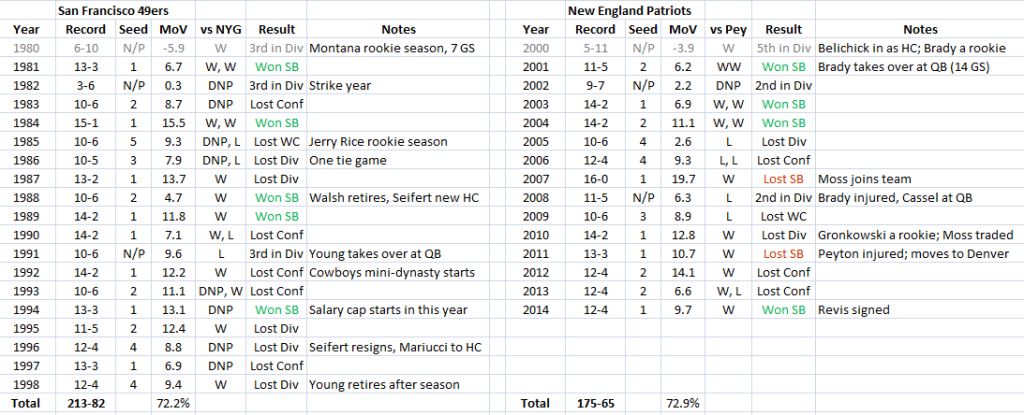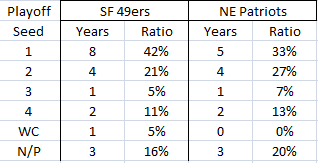M
MentalDisabldLst
Guest
So, a little discussion of the Niners' 1981-1998 run of sustained excellence in the GOAT has spurred me to post something that I threw together a month or two ago. Here's a little side-by-side to chew on:

MoV is margin of victory - point differential per game. You want to factor in strength of schedule? Go look up the SRS numbers on PFR. The "vs NYG" and "vs Pey[ton]" columns reflect the team's performance against its main rival of the era, which is important to some. Though you could probably argue that the 49ers' main rival shifted to Dallas starting in 1992.
And while we're at it, let's check out the relative frequencies of playoff seeds:

So there are a couple things that stand out to me:
Anyway, the comparison is, to me, stunningly parallel. Clearly the Niners' run is the only even remotely comparable sustained success to the present-day Pats - not even Lombardi (9 years, then retires) or could keep it going half as long as both these franchises have done. Tom Landry had an 18-year run, 1966-1983, where he made the playoffs every year but one, where he won 2 SBs and lost 3 more. And it's hard to compare Paul Brown's 13-year run from 1946-1958, the first 4 years of which were in the AAFC. Just an entirely different league then. I think these two dynasties are in a league of their own, and in a few more years, Belichick has a chance to be remembered as the better of the pair.

MoV is margin of victory - point differential per game. You want to factor in strength of schedule? Go look up the SRS numbers on PFR. The "vs NYG" and "vs Pey[ton]" columns reflect the team's performance against its main rival of the era, which is important to some. Though you could probably argue that the 49ers' main rival shifted to Dallas starting in 1992.
And while we're at it, let's check out the relative frequencies of playoff seeds:

So there are a couple things that stand out to me:
- Belichick and Brady may outlast two "generations" of their comparable numbers at coach and QB for the 49ers. Brady has 4 seasons to go to outlast Montana+Young; Belichick will pass Walsh+Seifert after 2 more years, and Mariucci's final years of glory 2 years after that, after the 2018 season.
- Seriously, they were 5-for-5 in the super bowl? Good christ.
- The Niners got a playoff bye in 63% of their dynasty seasons. The Patriots, 60%. A dead heat.
- The Niners won at a 72.2% clip, the Patriots 72.9%. Another dead heat.
- If you judge the true strength of a team by its MoV, the Niners basically never lost a playoff game they "should have" won. Which is incredible. The only real exceptions is 1992, where they should have beat Dallas at home in the NFCCG, and 1995 where an inferior GB team lucked into 14 points in the 1Q and then held off a SF rally. Their 1990 team was slightly worse than the Giants that year; the 1993 team was a statistical tie with Dallas, and the rest of their years they lost, they got beat by a better team (e.g. 1983 Redskins). The Patriots, obviously, can't say the same.
- Note: I've excluded Bill Walsh's first season running the 49ers in 1979, to make things match up a little more evenly. They went 2-14 that year and were the 2nd-worst team in the league. But if we're not counting Belichick's Cleveland run against him here, I think we can ignore that first anomalous year under Walsh. Both coaches got "their" QBs in place by their first non-grayed-out year and came out of nowhere to win the title.
Anyway, the comparison is, to me, stunningly parallel. Clearly the Niners' run is the only even remotely comparable sustained success to the present-day Pats - not even Lombardi (9 years, then retires) or could keep it going half as long as both these franchises have done. Tom Landry had an 18-year run, 1966-1983, where he made the playoffs every year but one, where he won 2 SBs and lost 3 more. And it's hard to compare Paul Brown's 13-year run from 1946-1958, the first 4 years of which were in the AAFC. Just an entirely different league then. I think these two dynasties are in a league of their own, and in a few more years, Belichick has a chance to be remembered as the better of the pair.

